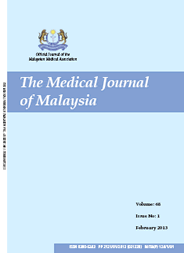MJM, Vol 70 Supplement 1 September 2015
Food supplement intake among adults: Findings from
the Malaysian Adult Nutrition Survey 2014
Institute for Public Health, Jalan Bangsar, Kuala Lumpur
ABSTRACT
Introduction: The use and variety of dietary supplements has increased over time in Malaysia. This presentation aimed to describe the use of food supplements among Malaysian adults.
Method: Data from the Malaysian Adults Nutrition Survey (MANS) 2014, a nationally representative survey were analysed. This cross-sectional survey using a two-stage stratified sampling method was conducted among adults aged 18-59 years old who were living in Malaysia. By using Kish selection method, only one eligible adult was selected from each household to participate in this survey. A set of validated questionnaire on food supplement intake was used and descriptive statistics were applied to obtain information on frequency and type of food supplement.
Results: A total of 3000 respondents participated in the study with a response rate of 99.7%. About 34.0% (95%CI: 31.37-36.77) of adults reported taking a food supplement in the past 12 month. Higher prevalence of women adults took food supplements than men. The most common food supplement taken was fish oil (26.24%; 95% CI: 31.37-36.77), followed by royal jelly (18.07%; 95% CI: 31.37-36.77) and spirulina (9.99%; 95%CI: 31.37-36.77). Most of the food supplements were taken daily. Among those reported ever taking food supplement, 68.0% of them took one supplement and 31.54% (95% CI: 31.37-36.77) took more than one food supplements. Three main reasons for taking food supplement were for health, boosting energy and for beauty.
Conclusion: This study indicated that food supplement use was prevalent in Malaysia especially among women. The increasing trend of food supplement use in Malaysia needs further research to provide scientific evidence of each type of supplements, as well as to evaluate their risks and benefits.
Keywords: food supplements, supplements, Malaysian Adults Nutrition Study (MANS)
